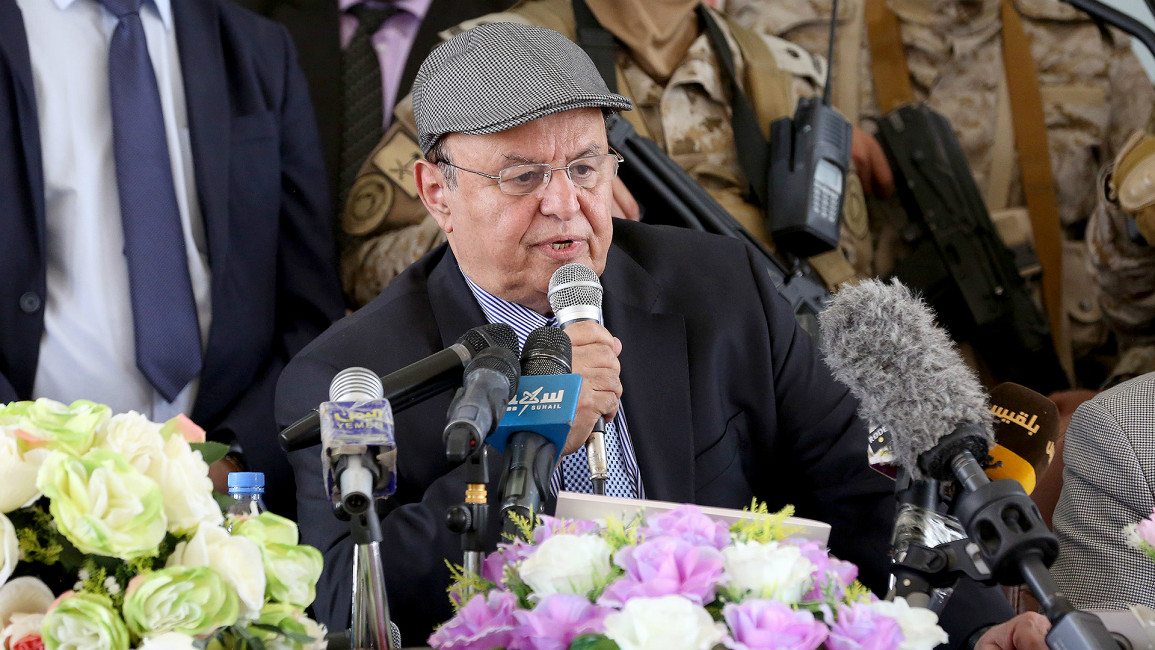
Yemen: A country in tatters and president in exile
It has been 18 months since Yemen was plunged headlong into a ferocious civil war and a relentless foreign military intervention.
The military intervention, dubbed Operation Decisive Storm led by the US-backed oil-rich Saudi Arabia, set out its main goals at the time including restoring Yemen's exiled president Abdu Mansour Hadi to power. Today, this goal is still unattainable and the president remains in exile.
For the last year and a half, Yemen's war has gone beyond armed clashes or sporadic skirmishes between the warring sides, turning into a fully-fledged war and one of the bloodiest conflicts in the region. The air force, the navy and ground forces have been part of the battle in a bid to incapacitate the Iran-backed Houthi militants and allied forces.
Despite extensive efforts of the Saudi-led Arab coalition to restore President Hadi to Yemen, the man has been unable to find a safe place for a home. This puts Yemen's internationally recognised government in a weaker position and pathetic situation. Today almost all of south of Yemen is free of Houthi rebels, but one element is still missing: a president.
Bringing the 'liberated' provinces under control and establishing stability and security would help Yemen's internationally recognised government to score other victories on various fronts.
However, seemingly President Hadi remains in the dark as to how and when he will to return to Yemen.
It is no secret that the south has been plagued by al-Qaeda militants and IS operatives, an alarming security threat to Yemen and the region. Radical militants have capitalised on the lax security status, planting themselves in the several southern provinces.
 |
Yemen is suffering the consequences of power-thirsty politicians and rivalry between regional powers |  |
Government forces backed by the Saudi-led Arab coalition have been waging a war on the terror operatives, attempting to purge them from the south as they did to the Houthi militants.
Now nine provinces are under the control of government loyal forces and fighters, and five other governorates are still contested. The Houthis and their allies have complete control of eight governorates.
His status as an internationally-recognised president should have obliged Hadi to return to Yemen and engage in contributing to improving the general living situation of people.
President Hadi is sticking to the UN Security Council resolution 2216, the Gulf Initiative and outcomes of the National Dialogue Conference, but his ability to implement the resolutions of dialogue is greatly reduced by his absence from the country, for distance leadership is ineffective.
From house arrest to exile
In January of 2015, Houthi militants surprised observers by placing the Saudi-backed Yemen interim President Hadi under house arrest. It was a turning point that heralded a bad omen for Yemen and a sign of coming violence. Hadi also sent his resignation to the parliament, but it was rejected.
After almost one month under house arrest, Hadi managed to escape from Sanaa to safety in Aden, and declared the withdrawal of his resignation.
 |
Distance leadership is ineffective |  |
At the time, the Houthi militants were perplexed and disgruntled. People thought President Hadi would run the country and live in Aden which he announced Yemen's temporary capital. But this was not to be.
Hadi fled from Aden, heading to Saudi Arabia as Houthi forces were pushing into Yemen's second largest city, Aden. In doing so, he dashed hopes of maintaining the rule of law in Yemen. To the present day, and with the exception of some flying visits to Aden, exile has been the only the option.
Sanaa: Hadi's dream
President Hadi is from the south, originally hailing from Abyan province. But if living in the south risks his life, where can he find safety in Yemen? The ultimate, though unrealistic dream of the beleaguered leader, is to rule from Sanaa which is currently controlled by the Iran-backed Houthi militants, and allied forces.
Sanaa and many cities have been heavily bombed by the Saudi-led Arab coalition. As the legitimate president, the sorties are being launched at Hadi's request. Thousands of people have been killed and injured by the airstrikes since March last year.
On 9 October alone, airstrikes left 140 dead and over 500 injured, but neither party to the conflict is without blame. Both have committed crimes against civilians, and both expect further bloodshed and warfare.
Yemen is suffering the consequences of power-thirsty politicians and rivalry between regional powers. It has become a fertile ground for war, and a playground for warmongers.
The country presently lies in tatters, and its internationally recognised president is in exile. It remains to be seen when the country can expect to have a legitimate president on its ground, and when the political ruin can begin to be repaired.
Khalid Al-Karimi is a freelance reporter and translator. He is a staff member of the Sana'a-based Yemeni Media Center and previously worked as a full-time editor and reporter for the Yemen Times newspaper. Follow him on Twitter: @Khalidkarimi205
Opinions expressed in this article remain those of the author and do not necessarily represent those of The New Arab, its editorial board or staff.




